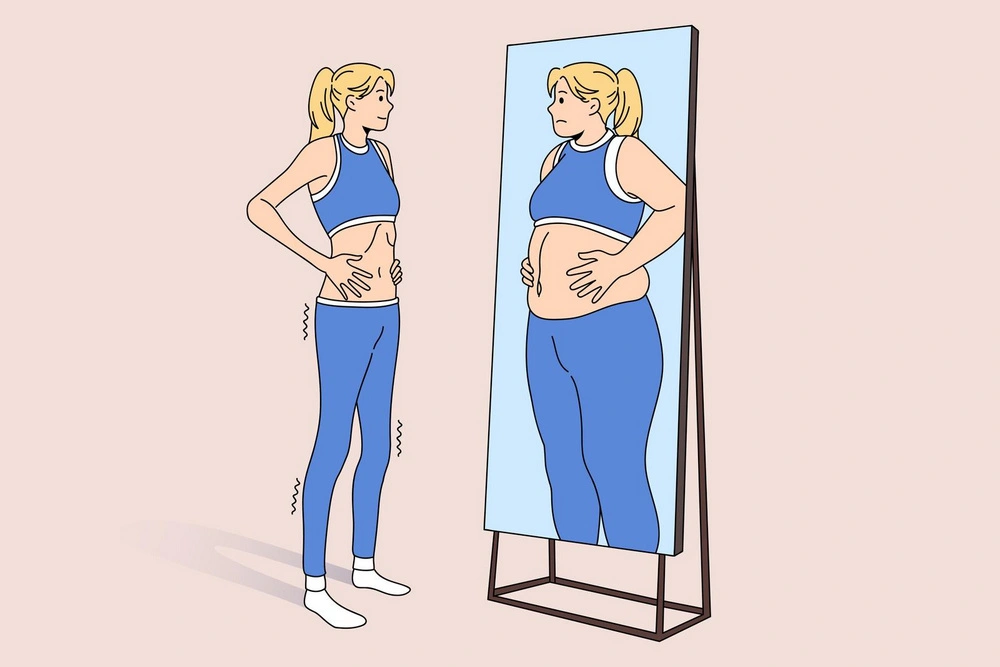Body Dysmorphic Disorder (BDD) is a condition that falls under the category of obsessive-compulsive and related disorders. While it is not directly related to eating disorders, the obsessive tendencies that relate to preoccupation can lead to eating disorders or vice versa. Eating Disorders (EDs) refer to a broad category of disorders like bulimia and anorexia. Understanding the interconnection, symptoms, and treatment options for eating and body dysmorphic disorders is important.
Understanding Eating Disorders

Eating Disorders can include things like anorexia, bulimia, purging, pica, and several other disorders, which are categorized by a pervasive obsession with physical appearance and weight. These disorders are categorized in their own group because most of the behaviors that result from that obsession have to do with controlling food, either by eating too much and purging or restricting what you eat.
The category of feeding and eating disorders is characterized by persistent disturbances with regard to eating or eating behavior. This tends to result in altered eating habits that significantly impair psychosocial and physical well-being.
Many individuals who struggle with eating disorders restrict their food consumption or indulge in overeating, followed by purging behaviors often directly related to a perceived and inaccurate view of their physical appearance or weight.
Understanding Body Dysmorphic Disorder
Body Dysmorphic Disorder (BDD) is a condition where individuals are preoccupied with the defects or flaws they perceive in their physical appearance. These defects and flaws are not things that other people generally observe and if they do they are considered slight and barely noticeable.
Body dysmorphic disorder falls under the category of obsessive-compulsive and related disorders because of the second main feature, which is that at some point, that same individual will utilize repetitive behaviors in response to their preoccupation, including:
- Skin picking
- Seeking reassurance
- Excessive grooming
- Mirror checking
This preoccupation and the repetitive behaviors cause clinically significant distress and impairment in important areas of function, including social and occupational areas.
The Connection Between BDD and EDs
There exists a strong connection with body dysmorphic disorder eating disorder in terms of symptoms and pervasive preoccupation. People who are obsessed with their appearance or their weight, as well as perceived physical flaws, are at a higher risk of developing both conditions as the strain on mental health results in obsessive behaviors and thoughts, compulsions especially relating to food.
Impact on Mental Health
With body dysmorphic disorder and eating disorders there is a significant impact on mental health. There are several emotional and psychological consequences of both BDD and EDs.
Anxiety and depression
People who struggle with BDD are more likely to develop depression. Some studies have found that nearly 55% of those with body dysmorphia disorder also had a depressive disorder. Body dysmorphic disorder is a significant predictor of anxiety as well, with an average of 95% of people developing some form of anxiety.
There are similarly high links between depression and eating disorders. Several studies have found that an average of 65% of people who struggle with an eating disorder will also experience depression, particularly major depressive disorder.
Tangentially, anxiety is one of the highest co-occurring mental health disorders for those with eating disorders.
- 47.9% of adults who have anorexia also have an anxiety disorder.
- 80.6% of adults with bulimia also have an anxiety disorder.
- 65.1% of adults with binge eating disorder also have an anxiety disorder.
Low self-esteem and self-worth
When you look at body dysmorphic disorder and eating disorders, there is a significant impact on other areas of mental health, particularly self-esteem and self-worth. Both conditions cause individuals to obsess about physical features or weight, which detracts from any feeling of confidence or self-esteem. If individuals feel that they are not able to control how they look or that their perceived flaws are getting more noticeable, it can make low self-esteem and low self-worth even worse.
Social isolation and relationship issues
Both conditions can subsequently lead to social isolation and relationship issues. Individuals who struggle with eating disorders, for example, will typically go out of their way to hide their eating-related behaviors.

For example:
Mary has an eating disorder. She struggles with a binge eating disorder. She doesn’t want anyone to know, so she won’t go out with her friends, family, or potential partners for meals because she is unable to utilize the harmful eating habits that she does in the privacy of her home. She also doesn’t let people over to her home during specific times to avoid exposing herself.
Now consider this:
Jonathan struggles with body dysmorphic disorder. He is a bodybuilder who has excellent tone and muscle development, but he spends 3 hours every day in the gym, minimum, because he believes that he has physical flaws that he needs to fix.
He is obsessed with his gym time and will not compromise it for anything, which inhibits his ability to maintain a steady relationship. He is constantly checking himself out in a mirror, grooming, and asking for reassurance about his physical appearance, which places a strain on his relationships.
Diagnosis and Assessment
Getting a professional diagnosis for eating disorders and body dysmorphic disorder is the first step in starting on a path of body dysmorphic disorder eating disorder treatment options.
If you believe that you have some of these symptoms or someone close to you has some of these symptoms, you’ll have to schedule an appointment with a qualified psychiatrist. A qualified psychiatrist will meet with you and review things like physical history, mental health history, current viewpoints and habits, among other things.
You might also get an assessment from your primary care physician regarding your nutritional health and those aspects of your eating disorders, which can be especially important when it comes to monitoring the physical impact that eating disorders or body dysmorphic disorders are having. However, a psychiatrist will work with you to ascertain whether you have qualifying symptoms for a mental health diagnosis.
Treatment Options
From there, treatment for body dysmorphic disorder and eating disorders looks very similar.
Cognitive Behavioral Therapy (CBT)
The first treatment option and the most common is cognitive behavioral therapy. This is used to treat both conditions and it helps to focus on recognizing negative thoughts and the impact they have on emotional reactions and particularly on harmful or obsessive behaviors. By learning to challenge your automatic negative thoughts pertaining to your body image and weight you can learn ways to handle your urges or eating behaviors in a way that is healthier.
Cognitive behavioral therapy can also teach you behaviors that improve your mental health, encouraging things like social activities and engagement with others.
Medication options and their effectiveness
There is no specific medication used to treat body dysmorphic disorder or eating disorders, but medications for other conditions like OCD and depression can be very useful.
In some cases, medication might be useful. Medication can be used to treat obsessive symptoms, but it can also be used for secondary mental health conditions like depression or anxiety. In these cases, when combined with cognitive behavioral therapy and other support, medication can be effective.
Nutritional counseling and support
Nutritional counseling and support go a long way toward helping you figure out what your triggers are, educating yourself about your disorder, and helping you learn skills that you can practice regularly.
Coping skills that you get from support groups can help you avoid isolation and stay focused on achieving your health goals. Nutritional counseling can provide the education you need to control your eating habits in a healthy and supportive way.
Summing up
There is a strong relationship between body dysmorphic disorder, eating disorder symptoms, and treatment. If you or someone close to you is struggling with either condition, it’s important to get help immediately to prevent secondary symptoms from manifesting and to help improve mental health. Seek professional help and support for managing eating and body dysmorphic disorders today.



